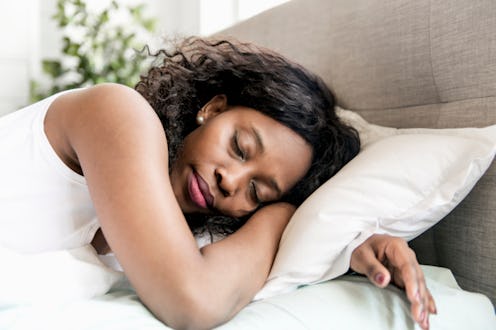
Getting enough sleep is essential for your body to heal and your brain to function optimally — but that's frustrating to hear if sleeping through the night is difficult for you. Fortunately, you don't have to rely on counting sheep. There are lots of nutritional supplements that improve sleep, often without any bothersome side effects. Some of them, in fact, are good for you even if you don't have trouble sleeping (more on why later).
"If you are experiencing lack of sleep for three or more consecutive nights, it might be time to consider a sleep aid," naturopathic doctor Alissia Zenhausern, NMD, tells Bustle. "Always consult your doctor before starting any sleep aid, as they may interact with medications you are currently taking. When it comes to choosing which sleep aid to use first, I recommend starting with Chamomile tea, as this is a safe and easy treatment to begin with."
If supplements alone aren't enough for you, there are other natural insomnia remedies. "Another natural treatment that has been very effective for sleep is acupuncture," Zenhausern says. "Acupuncture in traditional Chinese medicine is used to connect with the body using the meridian system. It works to improve your parasympathic system, which is your rest and relax state, vs. fight or flight sympathetic system."
Here are some supplements to try if you have trouble falling asleep or sleeping through the night.
1Valerian
Valerian root, which you can consume as a tea or a supplement, is a nervine, or a plant that calms the nervous system, Zenhausern says. "Valerian is an excellent herb to include in any herbal sleep formula," she says. "Not only does this plant work directly on the nervous system to help you relax for bed, but it also helps relax smooth and skeletal muscle to provide a total body relaxation aiding in sleep disorders."
2Chamomile
Chamomile tea not only tastes good but also helps relax you. And higher doses, like you'll find in a supplement, can make you conk out. "Chamomile is a mild nervous system sedative that can help relax your mind prior to bed," Zenhausern says. "Chamomile is also antispasmodic and anti-inflammatory and is often used in colitis or IBS conditions. It is a great herb to use if the cause of your insomnia comes from IBS or colitis."
3Melatonin
This is the chemical your brain naturally creates in the evening to make you sleepy. Melatonin is pretty powerful, so you don't want to overdo it, Zenhausern says — start with a small dose and don't go over 10 mg unless your doctor deems it appropriate. "Melatonin is typically used for patients with trouble falling asleep and staying asleep," she says. "However, never take melatonin past midnight, as it can lead to changes in your sleep cycle." And don't freak out if you have weird dreams; that's a possible side effect.
4L- Theanine
L- Theanine boosts your production of GABA, a neurotransmitter that promotes relaxation and sleep, Zenhausern explains. L- Theanine also lowers your heart rate, which makes it especially helpful if a rapid heartbeat is keeping you awake or waking you up. "L- theanine is used typically for those with racing thoughts that appear to keep them awake at night," Zenhausern says.
5Tryptophan
Ever wonder why everyone wants to doze off after Thanksgiving dinner? Aside from being in food comas, people who have eaten a lot of turkey have also just consumed a lot of tryptophan, an amino acid found in a number of different foods. It's especially helpful for improving the quality of stages 1 and 4 and REM sleep, Zenhausern says.
"Not only is Tryptophan a precursor for 5-HTP and serotonin to elevate your mood, but it also is a precursor to melatonin, the hormone naturally produced by the brain to help you sleep," she says. "Tryptophan is for patients who can go to sleep but feel unrefreshed when they wake up because they are not getting into the deeper cycles of sleep."
6Magnesium
Magnesium helps you produce melatonin, helping you fall asleep faster and improving the quality of your sleep, says Zenhausern. Magnesium glycinate is particularly good to take before bed if you have trouble sleeping.
To get the benefits of multiple sleep aids at once, you can try a combination supplement like Supervos sleep blend or Ortho Sleep. But it's best to start slow, work your way up if needed, and talk to a your doctor before starting anything new, says Zenhausern.